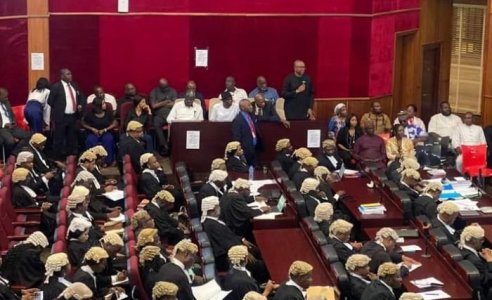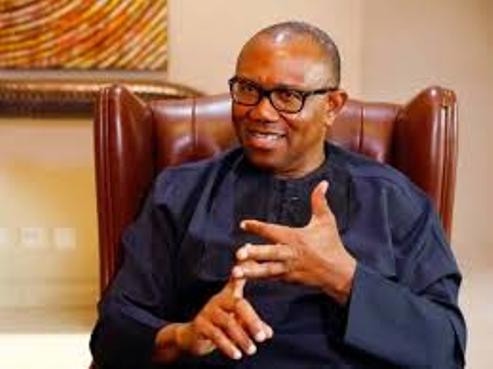LAGOS SEPTEMBER 9TH (NEWSRANGERS) — A court ruling that it is not mandatory for Nigeria’s electoral commission to transmit voting results electronically has thrown into doubt the future use of technology in Nigeria’s elections.
The ruling by the presidential elections petition court on Wednesday suggests the hope that innovation would foster transparency and justice in Nigeria’s often contentious elections might not be fulfilled.
The decision was part of a ruling by a panel of five judges of the appeals court in the capital Abuja that dismissed all challenges to Bola Tinubu’s victory in February’s presidential elections.
The judges unanimously said opponents Atiku Abubakar and Peter Obi did not prove their allegations that Tinubu was unqualified to run, that the polls were marred by malpractice or that the electoral commission INEC failed to follow laws mandating it to transmit and publish results electronically.
Lawyers for Atiku and Obi rejected the court’s decision and said they would appeal at Nigeria’s Supreme Court where a final ruling can be expected in 60 days.
Know More
Every Nigerian presidential election but one since 2003 has been challenged in court for alleged irregularities. Ahead of the most recent poll, the idea to electronically transmit results from over 177,000 voting units and publish them online for real-time viewing was to help preserve the integrity of results as declared before voters at each unit.
A new law and INEC’s guidelines codified the intent and stipulated the process for using a biometric device for voter verification and results transmission (BVAS), and uploading result sheets to a dedicated website (IReV). Mahmood Yakubu, chair of INEC, promoted both new platforms during his talk at the London-based think tank Chatham House in January.
But the elections court said the law allowed INEC to choose a manual transmission of results if it so wished. Petitioners had alleged that over 18,000 result sheets were illegible on the results website, raising questions about the validity of those results as announced during the collation process that preceded INEC’s declaration of Tinubu’s victory.
Alexander’s view
After multiple incidents of often violent disruption, the lowest turnout in seven elections and Tinubu’s slim margin of victory, many voters and some analysts raised questions about a “crisis of confidence” in future Nigerian elections. Those anxieties existed before the polls as democracy was tested around West and Central Africa. The stakes are just as high as such tests have continued in recent weeks.
Strong ethnic and religious tensions have clouded Nigeria’s elections since the first post-independence attempts in the 1960s, prefacing a slide into three decades of military dictatorships. Debates since democracy returned in 1999 have gradually introduced technology as a neutral lens to calm suspicions of malice. But the court’s ruling that essentially renders technology optional feels like a missed opportunity to institutionalize transparency by guaranteeing that players and umpires perform under the public’s unhindered gaze.
“Voter turnout has declined steadily since 1999 and will likely continue its downward slide as more people lose faith in the process,” Ayisha Osori, a Nigerian lawyer and director at the Open Society Foundations, the New York-based democracy advocacy nonprofit, told Semafor Africa. The verdict could frame elections as “a charade” that Nigerians simply decline to take part in, she said, though there is a chance for further legal clarification of the necessity of electronic transmission by the Supreme Court.
Another potential risk is that distrustful candidates avoid upcoming elections, as a former high-ranking cabinet minister Osita Chidoka (and member of the opposition who supported Atiku) suggested, describing the verdict as “the most damage done to our democracy.” Opposition boycotts are unlikely but apathy would allow the ruling All Progressives Congress to claim crucial state governorships unopposed.
Room for Disagreement
Mutalubi Ojo Adebayo, a senior Nigerian lawyer and member of Tinubu’s legal team, defended the current stance on technology’s place in Nigeria’s elections.
“IReV is just a viewing portal not a collation center. We’ve not reached the stage of electronic collation of results in Nigeria like they do in the U.S.,” Adebayo told Channels, a Nigerian TV network, on Thursday. “And I have challenged people to show that results declared at their polling units were different from what was online. Nobody has been able to say that.”
An adviser for Tinubu referred Semafor Africa to a statement which said the court’s verdict signaled the “continuing maturity of Nigeria’s legal system.”
Semafor
For advert placement, events coverage, media placement, public relation consultancy and further inquiries please whatsApp 2348023773039 or email: labakevwe@yahoo.com











